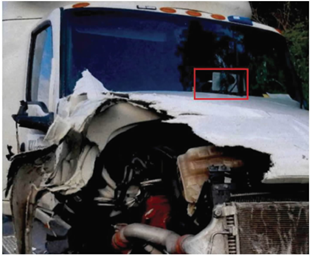
The key takeaway from G.H. Le Doux v. Western Express, Inc., 2023 WL 2842777 (W.D. Va. Apr. 7, 2023), is don’t spoliate evidence when your opponent has a photograph of it.
While the Le Doux defendant “succeeded in destroying a considerable amount of ESI,” in the words of The Hon. Paul W. Grimm, “Plaintiff was able to document this fact and ascertain the relevance of many deleted files. At the end of the day, this is the case of the ‘gang that couldn’t spoliate straight.’” Victor Stanley, Inc. v. Creative Pipe, Inc., 269 F.R.D. 497, 501 (D. Md. 2010)(Grimm, J.), aff’d in part, modified in part, 2010 WL 11747756 (D. Md. Nov. 1, 2010)(emphasis added).
The Le Doux case arose out of a multi-vehicle accident. Mr. Worthy, a defendant, had been operating a tractor-trailer that was involved in the collision. Plaintiff sought sanctions for spoliation of Mr. Worthy’s “personal tablet.” Defendants initially denied it existed; however, there was photographic evidence of it. Defendant Worthy then said he wiped it and gave it to his “girlfriend,” long after the duty to preserve had attached. The motion was granted and sanctions were imposed.
The chronology is set out below:
- August 11, 2018 – the accident occurred.
- September 4, 2018 – plaintiff’s first preservation letter was sent.
- September 24, 2018 – plaintiff’s second preservation letter was sent. Plaintiff asked for preservation of all ESI from the tractor-trailer and expressly asked for preservation of GPS data, a dash camera video, and, Omnitracs data. That was preserved. Plaintiff also asked for preservation of all other data and evidence related to the crash and the driver.
- December 9, 2020 – plaintiff emailed defense counsel, stating that photos showed a tablet on the dashboard. Defendants asked for a copy of the photo. Plaintiff sent the photo on the left. Defendants asked for a better copy and plaintiff sent a second photo.


- December 16, 2020 – plaintiff sent a follow up email asking about the tablet in the window. Defense counsel responded that “[t]here was nothing mounted on the windshield of the truck” and that their clients have “advised the driver did not have a tablet or screen, etc.” This was later shown to be incorrect.
- December 18, 2020 – defense counsel emailed a correction. The court wrote that: “They stated that after showing Worthy the picture sent by Plaintiff’s counsel, Worthy confirmed that the tablet mounted on his dash was his Rand McNally GPS (‘GPS tablet’) and that it was ‘not on at the time of the accident because [ ] he knew where he was going.’” This was also later shown to be incorrect.
- August 18, 2021 – “Defense counsel emailed Plaintiff’s counsel that Worthy was ‘not in possession of the GPS tablet,’ which they had already disclosed during discovery.” Plaintiff asked several questions.
- August 31, 2021 – “Defense counsel responded that they had confirmed with Worthy that he had ‘sold the [GPS] tablet sometime in 2018 and ha[d] no idea who he sold it to.’”
- March 10, 2022 –
- At his deposition Mr. Worthy confirmed that the GPS tablet was mounted on the windshield; however, he said it had programs other than the GPS installed.
- Plaintiff’s counsel produced the photograph, and Mr. Worthy testified that a different tablet – the “personal tablet” was shown in the photo. He also testified “I still have it to this day.” He said that he had not been asked to preserve it, no one had discussed it with him, he could still access it, and it had not been used while he was driving. He testified that it had no cellular service and he was listening to music on it. At that point in the deposition, defense counsel told Mr. Worthy to preserve it:
[Defense counsel]: Don’t destroy the tablet. Maintain the tablet. Don’t delete anything on it.
G.H. Le Doux v. Western Express, Inc., 2023 WL 2842777 (W.D. Va. Apr. 7, 2023)
THE WITNESS: The tablet’s been deleted.
Q: [ ] When did you delete it?
A: When I gave it to my girlfriend.
Q: And when did you do that? What date did you do that?
A: In 2021.
Q: Sometime beginning of the year or —
A: Beginning.
Q: Does she still have the tablet?
A: Yes.”
- June 29, 2022 – the tablet was submitted for a forensic examination.
Joseph Church, an analyst for Digital Shield, found most of the information on the tablet prior to June 2021 missing except for the timestamps of calendar events that existed before 2021. … Mr. Church provided that the information on the device prior to June 2021 “appears to have been removed from the device” and thus did not “contain any data which [was] relevant to the data and time of incident.” …. He also provided that the Samsung SM-T350, as a device, is capable of various items, including but not limited to connecting to Wi-Fi, Bluetooth connections, VPN access, taking pictures and videos, email, games, social media, playing movies and music, and YouTube.
G.H. Le Doux v. Western Express, Inc., 2023 WL 2842777 (W.D. Va. Apr. 7, 2023)
The Rule 37(e) sanctions analysis followed precedents. The Le Doux court defined spoliation and “relevance” in connection with the duty to preserve. Id. at *3. It held that the duty to preserve had arisen prior to the wiping. It easily concluded that the ESI was lost and that defendants had not taken reasonable steps to preserve it. Id. at *5. It determined that the information could not be restored or replaced. Id. at *6. It wrote:
Worthy could’ve been using the [personal] tablet for several things that would not require cellular service, such as watching a downloaded movie or using a downloaded app.
G.H. Le Doux v. Western Express, Inc., 2023 WL 2842777 (W.D. Va. Apr. 7, 2023)
It then determined that “a permissive adverse inference instruction against Worthy is proportionate to the prejudice and harm experienced by Plaintiff. The Court will thus instruct the jury that it is permitted, although not required, to presume that the lost data on Worthy’s personal tablet was unfavorable to Worthy.” Id. at *7. The court wrote:
Worthy’s act of deleting the data on his personal tablet further supports that he acted to intentionally deprive Plaintiff of this information. In December 2020, Worthy was put on notice that Plaintiff’s counsel was seeking the tablet because Defense counsel showed him a picture sent by Plaintiff’s counsel, which depicted a silver tablet in his windshield…. After being on notice that Plaintiff’s counsel was seeking the tablet mounted in his windshield, he deleted the data on his personal tablet and gave it to his girlfriend in early 2021…. Thus, he deleted his personal tablet’s data after—and within several months of—learning that Plaintiff’s counsel was attempting to collect data on the tablet mounted on his windshield.
It appears that defendants did not prepare a “data map” and there may have been some confusion about the “GPS tablet” and the “personal tablet”; however, this was an effective use of ESI by plaintiff’s counsel. ESI is both fragile and persistent. It exists in many forms. Here, the use of digital photographs demonstrated the existence of the “personal tablet” and led to sanctions. In Judge Grimm’s words, there was a failure to “spoliate straight.”


